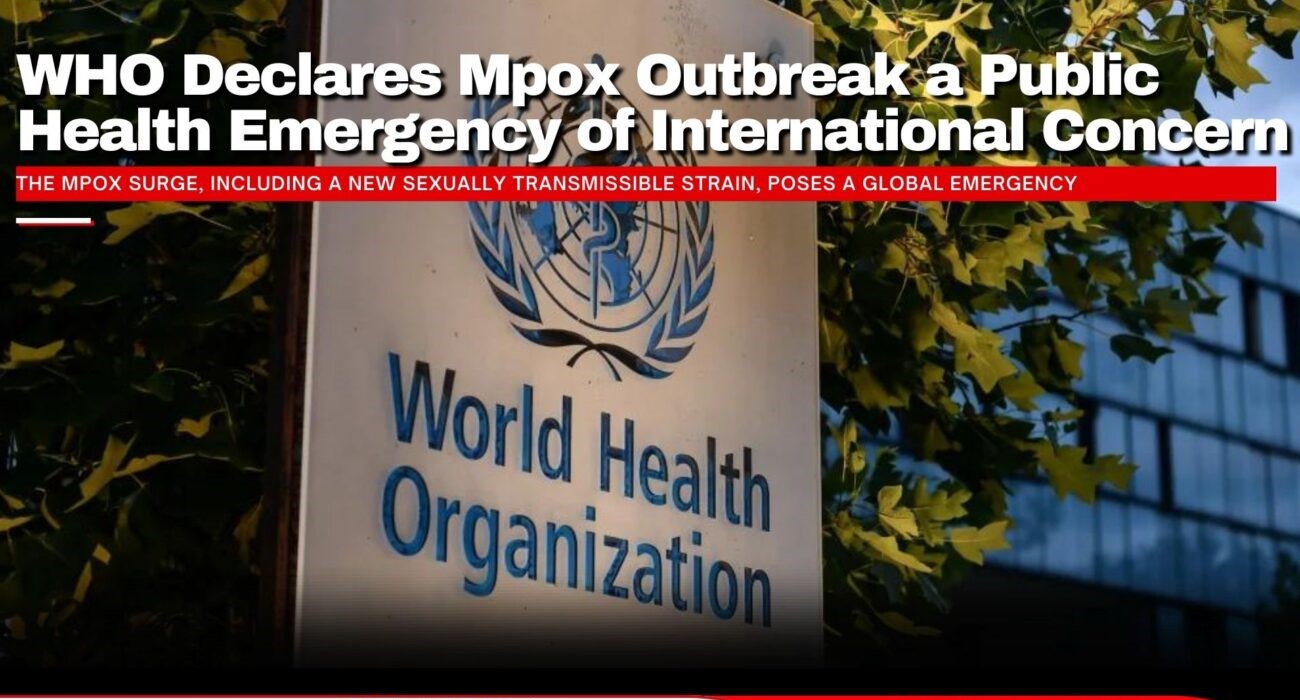The World Health Organization (WHO) convened an emergency committee in response to growing concerns that a more dangerous strain of the virus, clade Ib, has spread to four previously unaffected African countries. Previously, this strain was restricted within the Democratic Republic of the Congo (DRC).
Independent experts held a virtual meeting on Wednesday to advise WHO Director-General Tedros Adhanom Ghebreyesus on the seriousness of the outbreak. Following their consultation, he declared a public health emergency of international concern, the highest level of alert under international health regulations.
He said, “It is extremely concerning that a new clade of mpox has emerged and spread quickly in the eastern Democratic Republic of the Congo. It has also been found in neighboring countries where cases had not been reported before, and there is a chance that it will spread further throughout Africa and beyond.”
“I have followed the emergency committee’s recommendation, acknowledging that the situation warrants a public health emergency of international concern.”
This status, often abbreviated as PHEIC, is assigned by WHO to “extraordinary events” that pose a risk to other countries through international disease spread, potentially requiring a coordinated global response.
Committee Chair Dimie Ogoina emphasized, “The current mpox outbreak in Africa is just the tip of the iceberg. We lack a comprehensive understanding of the full extent of this virus’s impact.”
For the first time since the organization’s founding in 2017, the Africa Centres for Disease Control and Prevention (Africa CDC) designated the epidemic as a public health emergency of continental security on Tuesday.
Since the beginning of the year, more than 17,000 cases of mpox and over 500 deaths have been reported across 13 African countries, according to the Africa CDC, which has labeled the outbreak as a “very high-risk event.” The majority of cases—over 14,000—are concentrated in the DRC, accounting for 96% of confirmed cases this month.
Mpox, previously known as monkeypox, is a viral disease that spreads easily between people and from infected animals. Transmission occurs through close contact, including touching, kissing, or sexual contact, as well as through contaminated materials like bedding, clothing, and needles. Fever, an excruciating rash, headaches, back and muscular pain, low energy, and enlarged lymph nodes are among the symptoms.
For decades, the disease was largely confined to Central and West Africa, but in 2022, it began spreading to Europe and North America. WHO had previously declared mpox a global health emergency in July 2022, lifting that declaration in May 2023.
Mpox is characterized by two genetic clades, I and II, with clade Ib responsible for more severe disease. The 2022 outbreak was driven by clade II, but now multiple outbreaks of different clades are occurring in various countries, each with unique transmission methods and risk levels, according to Tedros.
While clade I mpox has not been identified in the United States, the US Centers for Disease Control and Prevention (CDC) is closely monitoring the situation. The US government has offered funding, assistance, and vaccines to support WHO and DRC’s efforts to combat the outbreak in Africa. The CDC has recommended vaccination for those in the US who are exposed to or at high risk of contracting mpox.
WHO officials have expressed optimism that the virus can be contained if the right actions are taken promptly. They are calling for international collaboration in funding and organizing response efforts and supporting research to better understand clade Ib and its spread.
Tedros emphasized, “A coordinated global response is crucial to stopping these outbreaks and saving lives.”
The organization has approved the Emergency Use Listing process for mpox vaccines and developed a regional response plan that requires $15 million, with $1.5 million already released from the WHO Contingency Fund for Emergencies.
Currently, 500,000 vaccine doses are in stock, and an additional 2.4 million could be produced by the year’s end. The DRC and Nigeria will be the first recipients of these vaccines, according to Dr. Abdou Salam Gueye, African Regional Emergency Director.
WHO stressed that vaccines alone are not enough to contain the spread. Enhanced surveillance, diagnostics, and research are essential to addressing “gaps in understanding” and effectively stopping the virus.
Dr. Maria Van Kerkhove, director of WHO’s Department of Epidemic and Pandemic Preparedness and Prevention, noted, “We have an opportunity right now to leverage this time and support our member states in the research needed to understand and combat this virus.”




